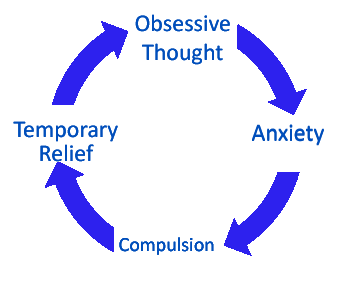OCD Treatment
Are you exhausted from doing what OCD tells you to do? It tells you that you can’t move forward unless you get things just right, cover every angle, think of every option, and check every detail. It might even tell you that you’re a bad person or that you’re not good enough. Catering to the demands of OCD robs you of time and energy and may effect your job, your relationships, even your sense of who you are! Friends and family really want to help, but they don’t understand how intense and intolerable the thoughts are. Here is some good news: You don’t have to live this way. OCD treatment can help.
“OCD is ruining my life!”
Getting treatment for OCD takes a lot of courage. Even looking at this page might be very difficult. Many people find it relieving to learn there are evidence-based methods proven to decrease and even defeat OCD. These treatments can help you get your life back.
I’m trained in two different methods for treating obsessive compulsive disorder: Exposure and Response Prevention (ERP), and Inference-based Cognitive Behavioral Therapy (I-CBT). These are both built specifically to deal with OCD and related issues. The best part about getting this therapy for OCD is that, when you finish therapy, you take these skills with you as you, so you’re ready to tackle OCD if it shows up in any part of your life.
Help for OCD
How does OCD treatment work?
To understand the basics of ERP therapy, we first have to look at the basics of OCD. OCD tells the brain that something is dangerous (like thoughts, numbers, objects, situations, germs, or messiness). This is the obsessive thought. The resulting anxiety has us jumping through hoops to avoid or ‘undo’ the dangerous thought or situation. Maybe we wash our hands, or say a certain mantra, or check the thing over and over (even if just in our minds). This is the compulsion.
By avoiding the thing we fear or the ‘undoing’ behavior, we slightly reduce our anxiety about the feared thought or situation, but that relief doesn’t last long. We also send a powerful signal to our brain saying, “good job. That was bad and now we are safe.” This message is called reinforcement. It reinforces the belief that the feared object or situation is indeed dangerous and worthy of all this effort to avoid, fix, figure out, or undo. Since that thought is worthy of avoiding or undoing— says the brain—then we better keep doing it! And so OCD becomes stronger over time—and we help it get stronger! So ERP says, let’s stop helping the OCD.
When you decide to engage in ERP, you’re taking the following steps with your therapist. First, you learn about the particular processes of your unique brand of OCD. You also learn mental skills to challenge those obsessive thoughts. Next, you and your therapist build a treatment plan designed to target the parts of your OCD that are hurting you the most. Finally, armed with knew knowledge and sense of purpose, you take action by facing the triggering situations that drive those obsessive thoughts. If this sounds like a lot, it is. It takes effort and dedication. But decades of studies show that a 8 to 16 weeks of ERP is successful for 65% to 80% of participants, with most people decreasing symptoms within a few weeks and many reporting they completely conquered their OCD.
ERP works for a lot of people, but not for everyone. Fortunately, there’s a different treatment called I-CBT, which has an entirely different approach. Some therapists and researchers think that I-CBT may be more successful for people who struggle with PTSD or trauma along with their OCD. It’s also a great option for people who get easily flooded or overwhelmed. Some autistic people, people on the autism spectrum, have expressed that this mode of treatment works better for them. And some people with Purely Obsessional OCD, or Pure O, express more success with I-CBT as well. Clinical trials indicate that I-CBT is not inferior to ERP, and more studies and trials are taking place right now!



